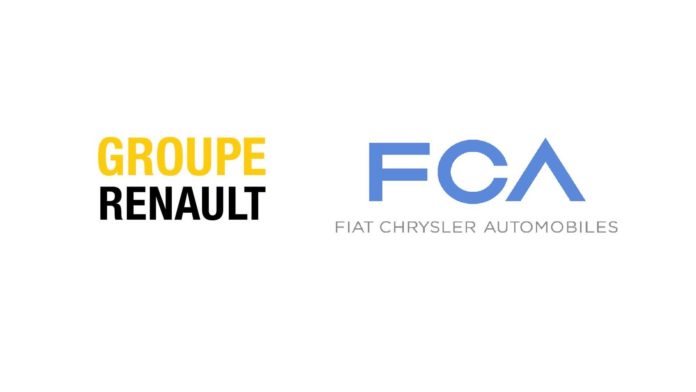
This week, Fiat Chrysler announced that it’s making plans to merge with Renault and create a company whose ownership would be split 50/50 between FCA and Renault shareholders. If the merger is cleared to go ahead, it would create the world’s third-largest vehicle manufacturing company – displacing General Motors – and be worth about $40 billion, selling 8.7 million vehicles annually. The combination would be carried out as a merger transaction under a Dutch parent company.
According to FCA, the new corporate entity’s board “would initially be composed of 11 members, with the majority being independent and with equal representation of four members each for both FCA and Groupe Renault, as well as one nominee from Nissan.” Renault’s board is said to be considering the merger.
“The FCA proposal follows initial operational discussions between the two companies to identify products and geographies where they could collaborate, particularly as they develop and commercialize new technologies,” wrote FCA in a news release announcing the proposal.
Analysts say the merger makes sense. It’s the kind of mega-alliance that will help automakers position themselves to be bigger players in twenty-first century technology, and the coming market storm of electric and autonomous vehicles. FCA reports that the combination of the two companies would save an estimated $5.6 billion annually thanks to common vehicle platforms, powertrains and technologies. The move is far from a done deal, however, as it needs to clear numerous regulatory bodies in Europe, particularly if it leads to European job losses, though FCA has stated that no plants would close as a result of the merger.
“Workers at both companies belong to strong, combative unions that will kill a deal that doesn’t guarantee jobs,” Erik Gordon, a law professor at the University of Michigan’s Ross School of Business, told the Detroit Free Press. “The French and Italian governments also will insist on job guarantees. If either country suffers job losses, the government will be run out of power.”
The New York Times has already reported that union officials in France are not happy with the idea.
“Nothing would prevent the Italian shareholder from favoring its national base. The C.G.T. considers that there is nothing good to expect from a Renault-F.C.A. merger,” according to the Times, quoting a statement from France’s C.G.T. labor union.
Italian Deputy Prime Minister Matteo Salvini was somewhat more positive about the prospects about the merger during a press conference attended by Reuters, though he too issued cautions about job losses.
“Fiat Chrysler expanding is good news for Italy … I count on it being a brilliant operation that preserves every single job while creating a European car industry giant,” he said.












